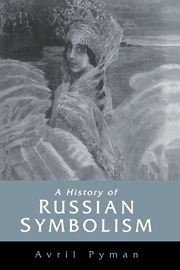Book contents
- Frontmatter
- Contents
- Preface
- Acknowledgements
- Note on the text and list of abbreviations
- Prologue: decadence or rebirth? The European fin de siècle and the Russian precursors
- Part 1 The art of the cell
- Part 2 Collective creation
- Part 3 Gleams of paradise
- 7 The turn of the century. The early poetry of the second generation of Russian Symbolists: Viacheslav Ivanov, Bely, Blok (1900–4)
- 8 The Sophia-myth and the theme of Apocalypse. The influence of Solov′ev and Nietzsche (1892 onwards)
- Part 4 A glittering hell
- Part 5 Our home from the beginning
- Epilogue
- Chronology
- Notes
- Bibliography
- Index
8 - The Sophia-myth and the theme of Apocalypse. The influence of Solov′ev and Nietzsche (1892 onwards)
Published online by Cambridge University Press: 08 January 2010
- Frontmatter
- Contents
- Preface
- Acknowledgements
- Note on the text and list of abbreviations
- Prologue: decadence or rebirth? The European fin de siècle and the Russian precursors
- Part 1 The art of the cell
- Part 2 Collective creation
- Part 3 Gleams of paradise
- 7 The turn of the century. The early poetry of the second generation of Russian Symbolists: Viacheslav Ivanov, Bely, Blok (1900–4)
- 8 The Sophia-myth and the theme of Apocalypse. The influence of Solov′ev and Nietzsche (1892 onwards)
- Part 4 A glittering hell
- Part 5 Our home from the beginning
- Epilogue
- Chronology
- Notes
- Bibliography
- Index
Summary
Ах, восстанут из тьмы два пророка.
Дрогнет мир от речей огневых.
И на северных бледных равнинах
Разлетится их крик боевой
О грядущих, священных годинах,
О последней борьбе мировой.
А. БелыйIt is often said that the first generation of Symbolists was influenced by the French, the second by German Romantic philosophy, particularly in aesthetics. In fact, as we have seen, Briusov, whose concept of Symbolism was at one stage directly inspired by the French movement and for whom the Gallic influence continued to be of major importance, was in himself a kind of ‘intermediate’ generation. For Minsky, Merezhkovsky, Hippius, Sologub and Bal′mont the French had played a comparatively minor part along with many other influences from Europe and North America.
Blok, it is true, was himself part German and loved the Jena Romantics and Heine. During his most impressionable years, however, he was more directly influenced by Merezhkovsky's ideas and by the poetry of Hippius, Briusov and Konevskoi than by any foreign reading. Bely was impressed by the same people in much the same way if, for Konevskoi, we substitute Bal′mont. He read Schopenhauer, Kant and Helmholtz as a schoolboy and the neo-Kantians, Marx and Kautsky after 1904 and used them extensively in his theoretical articles, but these can scarcely be called ‘literary’ influences. Ivanov spent long years studying in Germany, was aware of the philosophy behind the German Romantic movement, particularly Schlegel, wrote about, translated and deeply admired Novalis and had a profound affinity with the later Goethe, but he was a man of such deep and wide-ranging culture it would be absurd to limit him to any one land or age.
- Type
- Chapter
- Information
- A History of Russian Symbolism , pp. 226 - 242Publisher: Cambridge University PressPrint publication year: 1994
- 1
- Cited by



